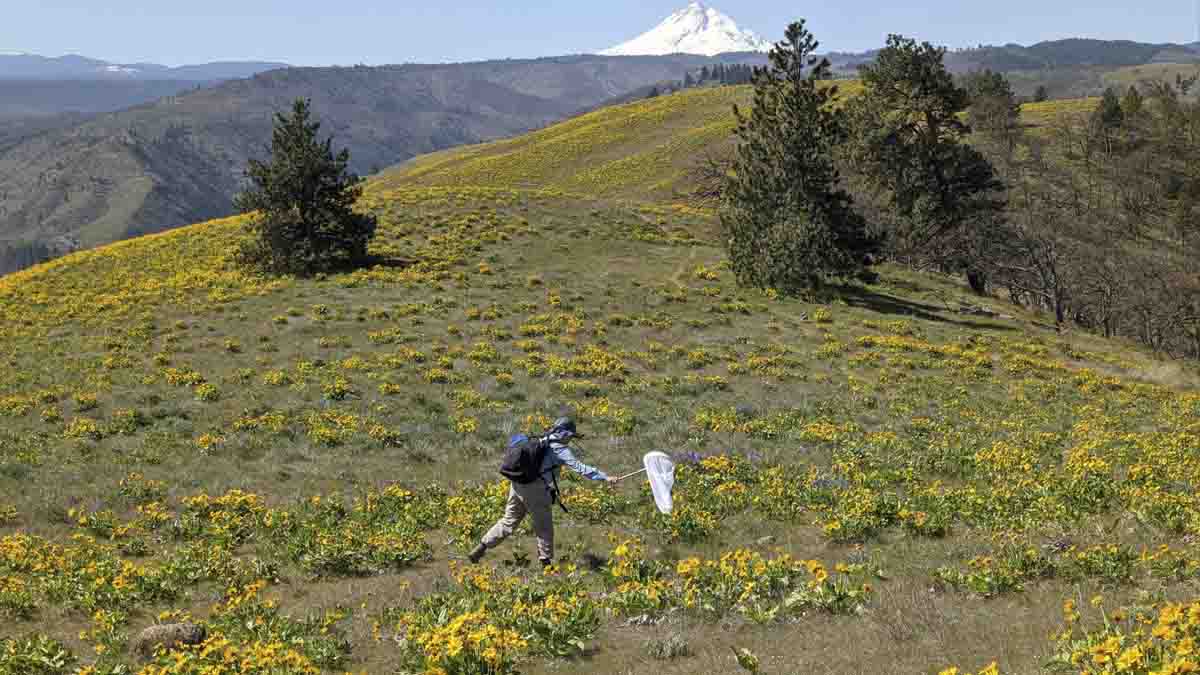Documenting Idaho’s Bees
October 02, 2024
University of Idaho Extension is working to build a program that will train volunteers to collect and identify bees, with the goal of establishing an atlas cataloging the rich diversity of bee species throughout the state.
Oregon State University Extension created the Master Melittologist Program in 2018, training citizen scientists to collect and curate specimens toward a broader goal of documenting the bees of the Pacific Northwest (PNW). UI Extension Educator Brad Stokes, of Canyon County, who specializes in horticulture and entomology, is collaborating with Andony Melathopoulos, an associate professor and pollinator health specialist with OSU Extension, to expand the program into the Gem State.
Stokes is pursuing funds to launch and sustain the program and has already begun building his base of volunteers.
Mellitology is the branch of entomology pertaining to the study of bees. Ten volunteers and four instructors — Stokes; Melathopoulos; Armando Falcon-Brindis, an entomology specialist at the U of I Parma Research and Extension Center; and Ron Bitner, an Idaho vintner and bee biologist who manages his vineyards for the benefit of pollinators — participated in an introductory training session hosted Sept. 12 at Deer Flat National Wildlife Refuge in Nampa.
Largely overlooked in the past, native bees are gaining recognition for their role in maintaining healthy ecosystems and pollinating agricultural crops. Pomology experts, for example, believe the native blue orchard bee will be more crucial for pollinating orchards in the future than domesticated honeybees.
“We’re figuring out that these native bee species are almost certainly better pollinators than Apis mellifera — the European honeybee,” Stokes said. “Idaho has such a diversity of crops — especially here in the Caldwell area where we have 140 different crops and a lot of seed crops — and we have a diversity of native bees that have been undocumented to date. We don’t even know what we have, and that’s a really important scientific question because you can’t protect something if you don’t know what species you have.”
The Master Melittologist Program trains volunteers to become naturalists who explore the landscape and collect bees, photographing any plants they discover supporting bees and placing bees associated with a common plant into the same jar. Volunteers who reach the program’s apprentice level are able to collect bees, prepare museum-quality specimen mounts and capture data in a scientifically robust manner. Volunteers who pass rigorous testing to reach the journey level are qualified to identify bees to the genus level. Their work is verified by a taxonomist. In both Idaho and Oregon, the program’s registration fee is $300.
OSU’s program has already produced more than 200,000 samples of native bees tied to associated plants, which is one of the world’s largest datasets of its kind. The program has identified 600 individual bee species, including dozens that were previously undocumented in Oregon. Melathopoulos anticipates some of them will eventually prove to be previously unknown bee species and will be assigned names. OSU has also developed a tool that draws from the database of bee species, their associated plants and the locations where they were found to provide site-specific guidance for landscape revegetation efforts.
The Washington State Department of Agriculture launched its own bee survey in 2023, also using Master Melittologist volunteers. The Washington Bee Atlas has since grown rapidly.
In 2020, Bitner and the College of Idaho received an $87,000 Specialty Crop Block Grant, provided by the U.S. Department of Agriculture and awarded through the Idaho State Department of Agriculture, to evaluate native bees in Treasure Valley specialty crop farm fields, employing a former Idaho middle-school teacher, Amy Dolan, to assist in the project. OSU later hired Dolan to train a small group of Idaho volunteers to begin work on cataloging specimens for an Idaho Bee Atlas. Dolan has since left the state, and partnering with UI Extension will bolster Idaho’s contributions toward cataloging the bees of PNW.
“We’re just in the perfect geographical location to find all of these species, and probably some that are yet to be documented,” Stokes said. “They might be closely associated with very rare flowers or plants, so their impact on the ecosystem might be extraordinarily important.”
The U.S. Fish and Wildlife Service has provided funding for the identification of bee species collected within National Wildlife Refuges in Idaho. Any bee specimens representing new species in Idaho counties or statewide will be added to the collection at the Orma J. Smith Museum of Natural History and the USDA Pollinating Insect Lab in Logan, Utah.
“The Great Basin has the highest bee diversity in the world, and Idaho sits at the crossroads of three major bee faunas,” Melathopoulos said. “All of the cool bees are in Idaho.”
For more information about the Idaho Master Melittologist Program, contact Brad Stokes at bstokes@uidaho.edu or 208-459-6003. Visit master-melittologist to enroll directly.
Published in Catching Up with CALS and Extension ExPress

About the University of Idaho
The University of Idaho, home of the Vandals, is Idaho’s land-grant, national research university. From its residential campus in Moscow, U of I serves the state of Idaho through educational centers in Boise, Coeur d’Alene and Idaho Falls, nine research and Extension centers, plus Extension offices in 42 counties. Home to nearly 11,000 students statewide, U of I is a leader in student-centered learning and excels at interdisciplinary research, service to businesses and communities, and in advancing diversity, citizenship and global outreach. U of I competes in the Big Sky and Western Athletic conferences. Learn more at uidaho.edu.






